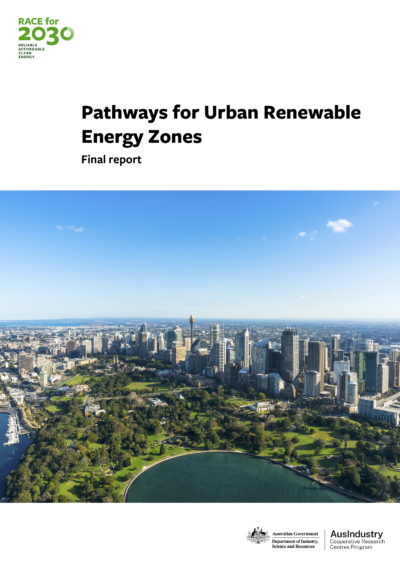16 December 2022, Sydney – Distributed Energy Resources (DERs) are a growing component of the Australian electricity network and are influencing decisions made around economic growth, environmental sustainability and social well-being. However, our current energy system cannot handle unchecked increases in DER.
Working through the RACE for 2030 CRC, Climate-KIC Australia, together with universities, state governments, technology providers, industry experts, electricity network businesses and energy retailers designed a study to explore whether an Urban Renewable Energy Zone (UREZ) is a useful mechanism to accelerate investments in DER while supporting the grid and driving other socioeconomic benefits in our cities.
The delivery team, led by Climate-KIC Australia, integrated extensive community and industry consultation with a wide range of information about renewable energy systems and their implementation. The project explored the integration of DERs and sought to assist in closing the knowledge gaps around UREZs and DERs, thus helping build capability for local councils, communities and more stakeholders. If acted upon, the findings within the report could lead to reduced costs and increased value for customers of local electrification, whilst aiding better grid performance.
The result of this initial sprint process has been to broaden the definition of UREZ from a dominantly technical project to a broader community-based collaboration effort to springboard ongoing innovation.
The strong view of stakeholders is that DER, enabled through a UREZ approach, will provide a pathway to quicker, cheaper, cleaner energy for communities while providing broader benefits to the energy systems. The research and consultations found that three interrelated forms of new value that a well-implemented UREZ could:
- reduce the cost and increase in the value of local electrification
- enhance grid performance and reduce cost of grid upgrades, and
- increase participation, attract investment to a region and amplify entrepreneurship and innovation
Moreover, UREZ has the potential to significantly improve community resilience, particularly in adapting to the impacts of climate change.
What’s next for UREZ?
Climate-KIC Australia is now working with community groups, local businesses, investors and councils across Australia to establish pilot UREZs that will demonstrate the value proposition of this model for replication and scale. Reach out if you would like more information on how we could work together.
The dialogue is no longer about whether a UREZ could be useful. Community representatives and businesses are already exploring how DER can be harnessed to implement UREZs. We have concrete, practical plans for implementing UREZ projects to achieve these significant outcomes. Over the next year we will be putting these plans into action.





